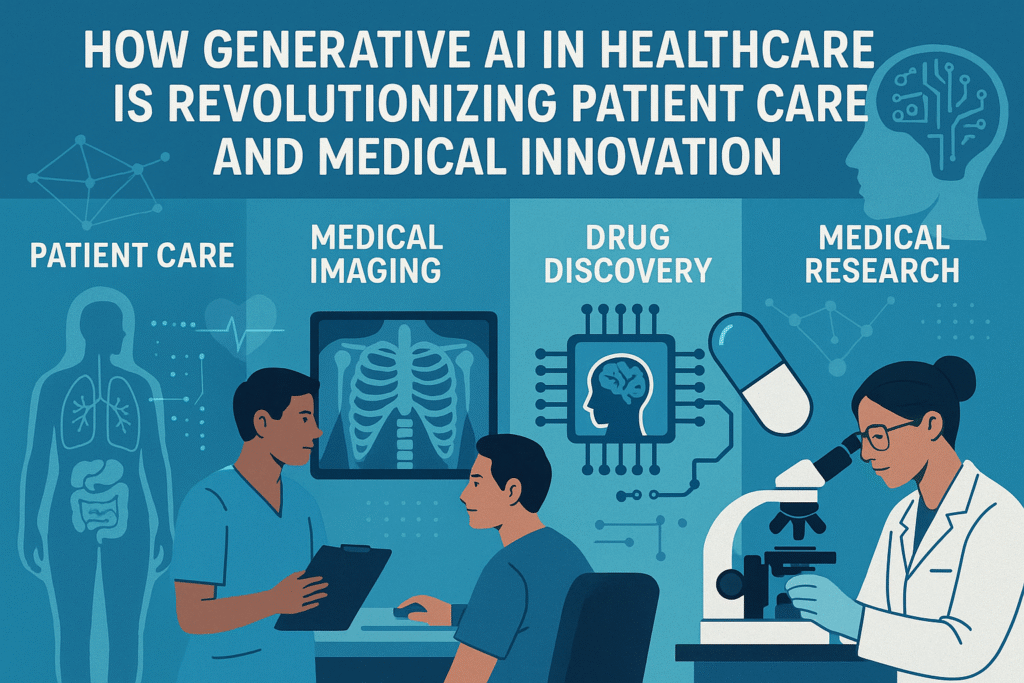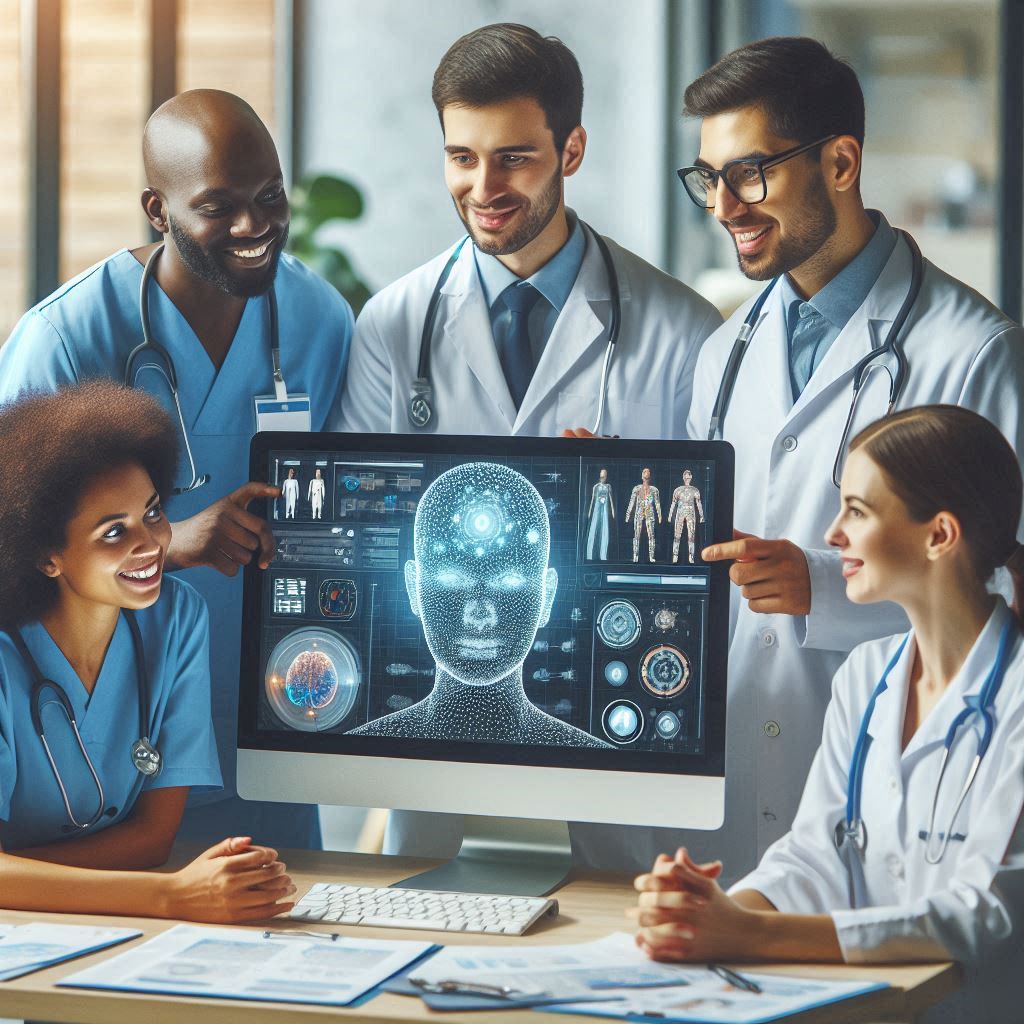How Generative AI in Healthcare Is Revolutionizing Patient Care and Medical Innovation

Generative AI in healthcare is one of the most exciting and transformative technologies shaping the future of medicine today. AI-driven medical innovation From creating new drug compounds to enhancing medical imaging and streamlining clinical workflows, generative AI is paving the way for a smarter, more personalized, and efficient healthcare system.
In this blog, we’ll explore what generative AI is, how it’s being applied in healthcare, its key benefits, and the challenges that come with it — all explained in simple, easy-to-understand language
What is Generative AI?
Generative AI is a type of artificial intelligence that can create new content, such as text, images, audio, and even molecular structures. It uses machine learning models like Generative Adversarial Networks (GANs) or transformer-based models (like GPT or DALL·E) to analyze vast datasets and generate new data that mimics the patterns it has learned.
In the healthcare space, generative AI is being used to:
- Develop new drugs
- Improve diagnostic imaging
- Personalize treatment plans
- Assist in robotic surgeries
- Generate synthetic medical data
Because of these powerful capabilities, generative AI in healthcare is becoming an essential tool for innovation and decision-making.
Why Generative AI Matters in Healthcare
Generative AI is revolutionizing healthcare by enhancing diagnostics, personalizing treatments, and streamlining administrative tasks. AI-driven models analyze medical images with high precision, enabling early disease detection. Personalized treatment plans improve patient outcomes by tailoring therapies to individual needs. In medical research, AI accelerates drug discovery and genomic analysis. AI-powered chatbots offer virtual health assistance, making healthcare more accessible. Robotic surgeries gain precision with AI-guided techniques, reducing complications. Administrative automation optimizes hospital workflows, cutting inefficiencies and costs. As AI continues to evolve, it fosters innovation, improves patient care, and expands healthcare possibilities, making medical services more efficient and effective.

Key Applications of Generative AI in Healthcare
- Drug Discovery and Development
Generative AI is revolutionizing the pharmaceutical industry. By simulating how molecules interact, AI models can generate new drug candidates in a fraction of the time traditional methods take.
Companies like Insilico Medicine and Atomwise are using generative models to:
- Predict how a drug will behave
- Identify potential side effects
- Create customized compounds for rare diseases
This significantly reduces the time and cost of bringing a new drug to market.
- Medical Imaging and Diagnostics
Another major use of generative AI in healthcare is in imaging diagnostics. AI models can generate synthetic images to train other AI systems, helping radiologists identify conditions such as tumors or fractures more accurately.
It can also:
- Enhance low-quality images
- Remove noise from scans
- Fill in missing data
- Highlight abnormalities automatically
This leads to faster and more reliable diagnoses.
- Personalized Medicine
Generative AI helps tailor treatments to each individual based on their genetic data, health records, and lifestyle. By analyzing this information, it can simulate how a patient might respond to a treatment — allowing doctors to choose the most effective therapy.
This approach not only improves patient outcomes but also reduces the trial-and-error process that often delays effective care.
- Synthetic Medical Data
Privacy is a major concern in healthcare. Generative AI can create synthetic (fake but realistic) medical records that mimic real patient data without revealing personal details.
This synthetic data is crucial for:
- Training AI systems without violating privacy laws
- Conducting research without real patient data
- Testing new software in controlled environments
- Virtual Health Assistants and Chatbots
Using natural language processing (NLP), generative AI powers chatbots that assist patients with:
- Appointment scheduling
- Medication reminders
- Symptom checks
- Pre-visit instructions
These AI-powered assistants reduce administrative workloads and provide 24/7 support for patients
Benefits of Generative AI in Healthcare
The advantages of implementing generative AI in healthcare are extensive:
- Faster diagnoses: AI can quickly analyze patient data and suggest possible conditions.
- Lower costs: Automation reduces manual labor and speeds up processes.
- Improved accuracy: AI models can detect subtle patterns that humans might miss.
- Better patient experience: Personalized care improves satisfaction and outcomes.
- Innovation in treatment: AI aids in discovering new therapies and medical devices.
With these benefits, generative AI is not just an enhancement — it’s a game-changer.
Challenges and Ethical Considerations
Despite its promise, generative AI in healthcare also comes with challenges:
- Data quality: AI is only as good as the data it’s trained on. Incomplete or biased data can lead to poor results.
- Privacy: Even synthetic data must be handled carefully to protect patient information.
- Regulation: AI-generated decisions must comply with healthcare regulations and ethics.
- Transparency: Doctors need to understand how AI makes recommendations to trust them.
- Bias: If training data includes biased patterns, the AI could reinforce health disparities.
Addressing these issues requires collaboration between data scientists, medical professionals, and regulators.
The Future of Generative AI in Healthcare
As technology continues to evolve, we can expect to see even more sophisticated applications of generative AI in healthcare. Future innovations may include:
- Fully AI-assisted surgeries using real-time data
- AI-designed vaccines tailored to genetic profiles
- Predictive models that identify disease outbreaks
- Virtual clinical trials using synthetic patient data
Healthcare providers who adopt generative AI early will be better equipped to deliver faster, smarter, and more personalized care.
Final Thoughts
Generative AI in healthcare is not just a trend — it’s a transformative force that is reshaping how medicine is practiced, drugs are developed, and patients are treated. With its ability to generate new insights, automate complex tasks, and personalize care, this technology is making healthcare more efficient, accurate, and accessible.
As we move forward, it’s crucial to embrace this innovation responsibly, ensuring it benefits all patients while upholding ethical standards. For healthcare marketers, researchers, and providers alike, understanding and leveraging generative AI will be key to staying ahead in this fast-moving industry.
